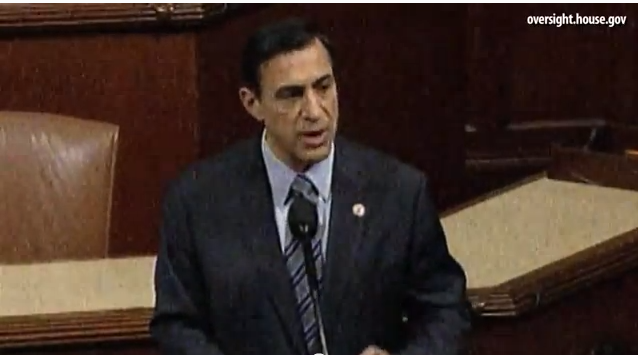Issa on $80 Billion in Spending Cuts Found by the Oversight Committee [VIDEO]
WASHINGTON – House Oversight and Government Reform Committee Chairman Darrell Issa, R-Calif., spoke during debate on H.R. 6684, the Spending Reduction Act of 2012. Reforms in the bill originating with the Oversight and Government Reform Committee would save taxpayers $80 billion over 10 years according to the non-partisan Congressional Budget Office (CBO). Issa expressed regret that Democrats were steadfastly unwilling to support needed spending cuts as part of an effort to avoid the fiscal cliff.
“This is the most humble and minimal proposal I could imagine,” Issa said. “We’re not getting close to a balanced budget with this. We’re simply making a down payment on it.”
“My Committee marked up one of the largest portions of these improvements,” Issa continued. “Which aligns the federal workforce’s compensation- including Members of Congress and their staff- a little closer to the rest of the workforce- a little closer to the rest of hardworking Americans.”
“And yet we can’t get a single Democratic vote,” Issa lamented. “I say to the Democrats, quite frankly, shame on you for not being able to make a down payment on a $10 trillion shortfall.”
– OGR Reforms in the Spending Reduction Act of 2012 will save taxpayers $80 billion over 10 years according to CBO by gradually bringing generous federal employee compensation in line with the private sector.
– The Spending Reduction Act of 2012 increases the employee pension contribution by 5 percent of salary over five years. Members of Congress will see their contribution increase by 8.5 percent. When these policies are fully phased in, federal employees and members of Congress will both be paying approximately 50% of the cost of their pension.
– The policy is based on the report of the President’s National Commission on Fiscal Responsibility and Reform, commonly known as the Simpson-Bowles Commission.
– A January 2012 CBO study found that federal employees receive an average of 16 % more in total compensation than their private sector counterparts. Federal employees receive on average 48% more in benefits, driven mainly by a very generous defined benefit pension plan.
– The Spending Reduction Act of 2012 also eliminates the supplemental payments for newly-hired federal employees who voluntarily retire before age 62. This is the extra $600 a month, on average, that federal employees receive on top of their pension benefit. Essentially, the current pension system pays workers more if they retire before reaching Social Security retirement age.
| Name | Document |
|---|---|
| December 20, 2012 Spending Reducton Act of 2012 | Document |
| January 2010 CBO Report on Compensation of Federal and Private Employees | Document |
| December 2010 Report from the President's National Commission on Fiscal Responsibility and Reform | Document |
